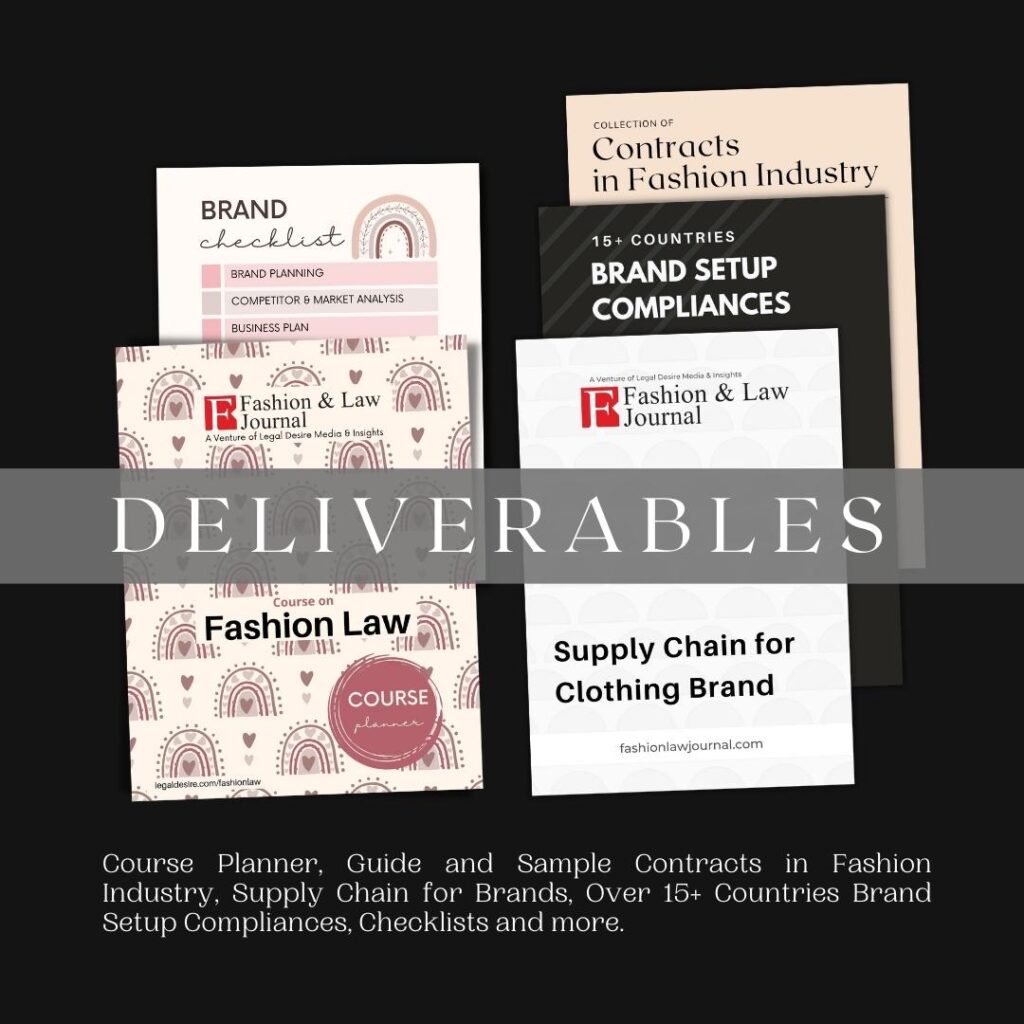A comprehensive curriculum is designed to delve deeper into the legal perspective of the fashion world. It acts as a conceptual guide to understanding the process of IP protection in fashion, laws associated with counterfeiting, ethics, and sustainability, licensing and franchise agreement, and the various redressal mechanisms in the fashion industry.
The following are the modules that are covered under the course:
Module 1: Introduction
This module will give an introduction to Fashion Law by explaining its history and evolution. It further throws light on the work profile of a fashion lawyer and discusses the legal issues in the fashion industry.
- What is Fashion?
- History and Evolution
- The fashion industry and Stakeholders
- Who is a Fashion Lawyer?
- Work Profile of a Fashion Lawyer
- Legal Issues in Fashion Industry
- Laws Relating to Fashion Industry
Module 2: Compliances required for a Fashion Brand
This module is designed to comprehensively explain business registration, IP protection, banking, taxation, corporate regulations, employment including Prevention of sexual harassment at the workplace, and other compliances required for a fashion brand. This module also discusses the prominence of international trade and its legal issues.
- Registration
- Protection
- Real-Estate
- Banking & Taxation
- Employment
- Trade
- Corporate Compliances
- Prevention of sexual harassment at the workplace
- Other compliances.
Module 3: Fashion, Ethics and Sustainability
While the road towards sustainability, in general, isn’t easy, it’s now critical that we all learn what qualifies as truly sustainable and ethical fashion. This module teaches just that, from examining raw materials used to the practices implemented all the way down the supply chain. We hope to not only educate you on the problematic status of the industry as it currently stands but also provide you with the knowledge necessary to judge whether a clothing company or item is truly ethical.
- Sustainable Fashion
- Laws Applicable
- Initiatives by Brands
- Way Forward
- Cultural Appropriation
- Fast Fashion vs. Slow Fashion
Module 4: Supply Chain Issues
Delivering new items to markets all around the world is a difficult and complex process for many fashion, apparel, and lifestyle firms. Poor communication, which stems from poor collaboration and data visibility, is one of the most significant difficulties faced by fashion businesses. Transporters, warehouses, merchants, and even consumers are all part of a supply chain. This module focuses on the issues faced at various stages in the complex supply chain of the fashion industry.
- Fashion Supply Chain Process
- Procuring Raw Material
- Perishability
- Demand Volatility
- Loyalty
- Promotion
- Customer Tolerance
- Communication
- Collaboration
- Coordination
- Cost
- Centralization of data
- Compliance
- Disputes
Module 5: Fashion and Business
This module is designed to decode the complexities in Fashion Law and Business and offers straightforward guidance on a wide range of legal and business challenges that fashion industry participants, such as designers, suppliers, garment manufacturers, and retailers, confront.
- Brand Setup
- Supply Chain
- Production Process
- Distribution Process
- Franchising
- Marketing and Sales
- International Trade
Module 6: Fashion & IPR
This module offers an intensive explanation of the major IP sub-area of copyright, trademark and trade dress, design, patent and geographical indication. It explores the magnitude of these laws in the protection of the fashion brand. The module is intended to teach the participants international filing.
- Copyrights
- Trademark and Trade Dress
- Design
- Patent
- Geographical Indication
- Domain Name
- Trade Secret
- International Filing
Module 7: Fashion and Employment Law
Employment law is the branch of law that deals with the relationship between employers and employees, including what employers can expect and ask of employees, as well as employee rights in the workplace. This module is designed to understand the various rights, conditions and welfare schemes of employment in the fashion industry.
- Employment Nature & Agreement
- Applicable Laws (Labour Codes and Human Rights)
- POSH
- Rights of Fashion Models, Photographers, Designers, and other stakeholders.
- FDCI/Fashion Council Regulations
Module 8: Fashion and Negotiation
This module offers an overview of legal issues to be aware of when running a fashion business and provides details of the relevant contracts, and terms to consider in negotiations with contractors, to ensure adequate legal protections are in place. The participants will be taught how to draft various agreements pertaining to the fashion business.
- Types of Agreements
- Licensing Agreement
- Manufacturer Agreement
- Vendor Agreement
- Supplier Agreement
- Distribution Agreement
- Modeling Agreement
- Celebrity/Influencers Agreement
- Marketing and Advertising Agreement
- Non-Disclosure Agreement
- Franchise Agreement
- E-Commerce and Website Policies
- Business Policies (Refund/Return/Exchange)
Module 9: Counterfeiting
Unlike other industries, counterfeiting fashion products is much easier. Counterfeiters just copy-paste the look and add the brand’s name. In the digital era, fashion forgers have extensively impacted the fashion industry. This module will address various mechanisms like anti-counterfeiting, anti-piracy and consumer protection.
- Counterfeiting
- Remedies
- Complaint Mechanism
- Anti-Piracy
- Anti-Counterfeiting
- Product Liability and Consumer Protection











